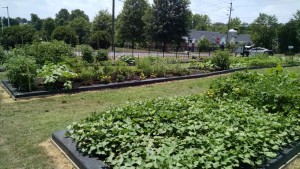Getting Connected With Community Gardens
go.ncsu.edu/readext?366623
en Español / em Português
El inglés es el idioma de control de esta página. En la medida en que haya algún conflicto entre la traducción al inglés y la traducción, el inglés prevalece.
Al hacer clic en el enlace de traducción se activa un servicio de traducción gratuito para convertir la página al español. Al igual que con cualquier traducción por Internet, la conversión no es sensible al contexto y puede que no traduzca el texto en su significado original. NC State Extension no garantiza la exactitud del texto traducido. Por favor, tenga en cuenta que algunas aplicaciones y/o servicios pueden no funcionar como se espera cuando se traducen.
Português
Inglês é o idioma de controle desta página. Na medida que haja algum conflito entre o texto original em Inglês e a tradução, o Inglês prevalece.
Ao clicar no link de tradução, um serviço gratuito de tradução será ativado para converter a página para o Português. Como em qualquer tradução pela internet, a conversão não é sensivel ao contexto e pode não ocorrer a tradução para o significado orginal. O serviço de Extensão da Carolina do Norte (NC State Extension) não garante a exatidão do texto traduzido. Por favor, observe que algumas funções ou serviços podem não funcionar como esperado após a tradução.
English
English is the controlling language of this page. To the extent there is any conflict between the English text and the translation, English controls.
Clicking on the translation link activates a free translation service to convert the page to Spanish. As with any Internet translation, the conversion is not context-sensitive and may not translate the text to its original meaning. NC State Extension does not guarantee the accuracy of the translated text. Please note that some applications and/or services may not function as expected when translated.
Collapse ▲Community gardens have become a growing trend across the country. Not only do community gardens connect individuals to the land and to the food, but also provide a connection to the community. Typically, a community garden is a joint project developed on shared open spaces where participants work together in the maintenance of the garden. Some community gardens are designed specifically for individuals to grow gardens for personal use. Other community gardens are designed for organizations to grow food that will be provided to local food assistance programs.
Diggin’ garden benefits. Besides just being fun and enjoyable, there are many benefits to gardening. Gardens offer physical and mental health benefits by providing opportunities to access fresh fruits and vegetables, be physically active, and to de-stress. Creating green space and beautifying vacant lots and public parks are just some of the environmental benefits. Community gardens can also help decrease violence in neighborhoods and foster social well-being by strengthening social connections.
Gettin’ connected. Gaston Community Gardens (GCG) is a network of county organizations engaged in gardening to foster health, education, and a connected community. The GCG is coordinated by N.C. Cooperative Extension and you can learn more online at www.gastoncommunitygardens.com. Currently the GCG consists of three active community gardens: Gastonia Rotary Garden, Highland Community Garden, and Mt. Holly Community Garden. The GCG also has school garden participation through Cooperative Extension’s “Healthy Harvest” elementary school gardening program.
- Gastonia Rotary Garden is a community service project of the Gastonia Rotary Club. Each of their 43 garden plots is managed by a different community group. Two beds are reserved for persons with disabilities. Their mission is to feed the hungry, teach a new generation about gardening, and to beautify Franklin Boulevard.
- Highland Community Garden has 18 large beds established on Gastonia City property and coordinated by Keep Gastonia Beautiful. The garden is open to residents of the Highland community and surrounding areas. The project’s goals include building community, beautification, and providing education in the Highland community.
- Mount Holly Community Garden has 52 garden beds (6 adapted beds) located at First United Methodist Church. It currently operates under Mount Holly Farmers Market’s non-profit status. The garden engages families to increase healthy eating and to build a stronger community. The garden helps to supply food banks, and offers summer youth programs and educational workshops.
- Healthy Harvest is a school gardening program coordinated by Gaston County Cooperative Extension at ten elementary schools. The program offers hands-on curriculum and classes, and supports schools in developing their own gardening and nutrition initiatives.
Cooperative Extension provides comprehensive resources to help you start and manage a successful community garden. To learn more about community gardens or to connect your organization’s garden with Gaston Community Gardens, contact the Cooperative Extension Horticulture Agent, Julie Flowers (704-922-2104 or julie_flowers@ncsu.edu).





